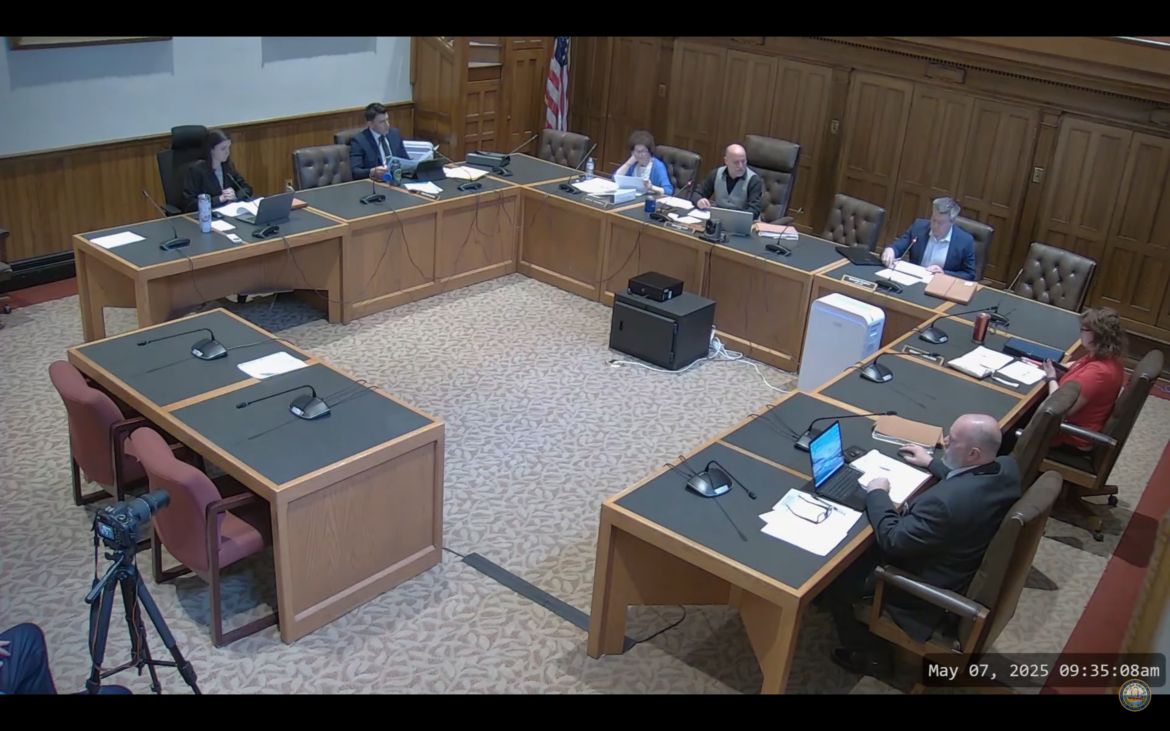By GARRY RAYNO, InDepthNH.org
CONCORD — The Senate Ways and Means Committee had a more optimistic outlook for the state’s economy than the House when it met Wednesday to finalize revenue estimates for the next two fiscal years.
When the committee completed its work in about two hours, the Senate’s projected revenues would be $228.1 million more than the House’s, but $172.1 million less than Gov. Kelly Ayotte projected for the general funds including the Education Trust Fund.
Committee chair Sen. Timothy Lang, R-Sanbornton, said he was optimistic because the Federal Reserve is expected to lower interest rates by the end of the year and that should spur the economy.
But Sen. Cindy Rosenwald, D-Nashua, noted the current economic turmoil and said many are now predicting the economy will be in recession within six months, but said she is more optimistic about fiscal 2027 after thing settle down a bit.
Sens. Keith Murphy, D-Bedford, and Donovan Fenton, D-Keene, were also more cautious as both are business owners and they said things are challenging right now.
The Senate has the advantage of seeing April revenue numbers, which is the single biggest month for state revenues, although the numbers were disappointing, particularly for business taxes which are $156.3 million below estimates for the fiscal year to date and $134.5 million less than last year at this time.
But business taxes and lottery revenues were the biggest changes between what the House Ways and Means estimated for revenues and the Senate’s projections.
The Senate projected business taxes would produce $2.29 billion for the next biennium, which is $123 million more than the House estimates, but $170 million less than Gov. Kelly Ayotte’s estimate.
The other big ticket item that helped boost the Senate revenues estimates over the House is charity casino gambling
revenues through and the growing number of slot machines which now run historic horse racing but could soon be converted to the real thing under a bill making its way through the legislature with Ayotte’s blessing.
The Senate Finance Committee is projecting Lottery revenues for the 2026 fiscal year will be $200.3 million and the same for fiscal 2027, while the House projected $172.9 million both fiscal years, and the governor $185 million the same for both.
That makes the Senate revenue projections $95 million more than the House and $71 million more than the governor.
The only area where the Senate estimates were below both the governor and the House was the rooms and meals tax where the committee was $28 million below the House and $17.8 million below the governor.
The Senate estimates for how the current fiscal year will end revenue wise, is also a little more rosy than the House’s expectations, and will give the Senate Finance Committee a total of more than $260 million to eliminate some of the cuts in the House budget.
The estimates of the governor, House and Senate for how the current year will end are all below the estimate of $3.165 billion, with the governor at $3.12 billion, the Senate $3.08 billion and the House $3.01 billion.
The Senate is projecting that revenues for the next biennium will be $6.1 billion, the House $5.87 billion, and the governor $6.27 billion.
At the public hearing on the budget the night before that went until about 11 p.m., hundreds of people spoke about the potential devastating results if the House budget goes into effect, many focusing on the proposed 3 percent cut to Medicaid reimbursement rates, and cuts to developmentally disabled and mental health services.
Others were concerned about the $50 million reduction in state aid to the University System of New Hampshire with one student telling the Senate Finance Committee it sends the absolutely wrong message to the state’s high school graduates that the state does not value them by making college affordable enough for them to remain in the state.
Others were concerned that public education is still not being adequately funded while lawmakers can find tens of millions dollars for the Education Freedom Account program which subsidizes wealthy families who can already afford to send their children to private schools.
But mostly the Senate heard from parents trying to take care of their developmentally disabled offsprings, or spouses wanting their partners to receive care at home and not in a nursing home, or from individuals who can ill afford to pay medical bills if Medicaid is scaled back.
They also heard from members of boards and agencies that would be eliminated under the House budget like the Office of the Child Advocate, the Human Rights Commission, the Housing Appeals Board, the Commission on Aging, and about other boards and programs that would be significantly reduced such the Division on the Arts, the Family Planning program, the Tobacco Prevention and Cessation Program and the Prescription Drug Affordability Board.
The House’s $15.5 billion budget for the next biennium is about $514 million less than Gov. Kelly Ayotte’s proposed budget, cutting hundreds of millions of dollars from health and social services, and millions more from the Department of Corrections, the Attorney General’s Office and the Department of Environmental Services.
While the Republican majority in the State House has taken tax increases off the table, the House budget increases about 90 fees to bring in an additional $60 million.
With the Senate Ways and Means Committee’s decisions Wednesday, the Senate Finance Committee now knows how much money they have to work with to begin addressing their priorities and the holes in the House’s budget their constituents want addressed.
The amount of money the Ways and Means Committee made available is only about half of what the House cut from Ayotte’s proposed budget and some groups were not pleased with her budget proposal.
The Senate Finance Committee meets Friday to begin its initial work on its proposed budget.
Garry Rayno may be reached at garry.rayno@yahoo.com.





